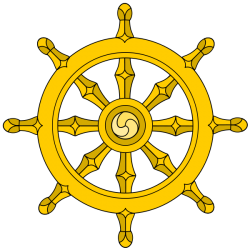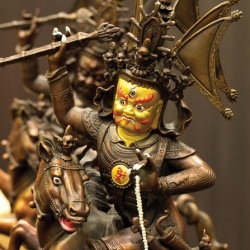Difference between revisions of "Chökhor Düchen - The First Turning of the Wheel of Dharma"
| Line 2: | Line 2: | ||
'''[[Chökhor Düchen]]''' - '''[[The First Turning of the Wheel of Dharma]]''' | '''[[Chökhor Düchen]]''' - '''[[The First Turning of the Wheel of Dharma]]''' | ||
| − | Friday, 12 July 2013 marks [[Chökhor Düchen]] ([[Wyl.]] '''[[chos 'khor dus chen]]'''), the '{{Wiki|Festival}} of [[Turning the Wheel of Dharma]]' — one of the four major [[Buddhist]] holidays. It occurs on the fourth day of the sixth [[Tibetan]] [[lunar month]]. For seven weeks after his [[enlightenment]], [[Buddha]] did not teach. Finally, encouraged by [[Indra]] and [[Brahma]], he turned the [[Wheel of Dharma]] for the first [[time]], at [[Sarnath]], by [[teaching]] the ‘[[Four Noble Truths]]’. | + | [[Friday]], 12 July 2013 marks [[Chökhor Düchen]] ([[Wyl.]] '''[[chos 'khor dus chen]]'''), the '{{Wiki|Festival}} of [[Turning the Wheel of Dharma]]' — one of the four major [[Buddhist]] holidays. It occurs on the fourth day of the sixth [[Tibetan]] [[lunar month]]. |
| + | |||
| + | For seven weeks after his [[enlightenment]], [[Buddha]] did not teach. Finally, encouraged by [[Indra]] and [[Brahma]], he turned the [[Wheel of Dharma]] for the first [[time]], at [[Sarnath]], by [[teaching]] the ‘[[Four Noble Truths]]’. | ||
| + | |||
| + | There are, within [[Tibetan Buddhism]], four “great occasions” (called [[düchen]], in [[Tibetan]]) – marking the four major [[deeds]] of the [[Buddha Sakyamuni]]. | ||
| + | |||
| + | Earlier this year, in March and June, we observed and spoke about the first two “great [[deeds]]” – [[Chötrul Düchen]] and [[Saga Dawa Düchen]], which celebrate the [[time]] when the mythos tells us the [[Sakyamuni]] performed fifteen days of [[miracles]], and the day on which he [[realized]] [[Enlightenment]] respectively. | ||
| − | |||
[[File:Lord Setrap Chen.jpg|thumb|250px|]] | [[File:Lord Setrap Chen.jpg|thumb|250px|]] | ||
| − | Today, we observe the third of these great occasions, | + | Today, we observe the third of these great occasions, [[Chokhur Düchen]] – which commemorates the [[First Turning of the Wheel of Dharma]] ([[Buddha]] [[Sakyamuni’s]] [[first sermon]] to five of his former brother renunciates, following his [[Enlightenment]]). |
| + | |||
| + | This [[first sermon]], given forty-nine days after his realisation, was a pivotal [[teaching]] encapsulated what we now refer to as the [[Four Noble Truths]]. Not only was this the first major {{Wiki|discourse}} of [[Buddha Sakyamuni]], but more importantly, it contains the entire [[essence]] of all his subsequent [[teaching]], becoming the common ground for all [[Buddhist traditions]]. | ||
| + | |||
| + | In the [[Tibetan tradition]], [[Chokhur Düchen]] is a day of [[pilgrimage]]. | ||
| + | |||
| + | Practitioners visit the various “{{Wiki|holy}} sites”, leaving [[offerings]] of [[incense]], hanging [[prayer flags]], and engaging in [[Asalha Puja]] [[sadhanas]]. | ||
| + | |||
| + | The turning of hand-held or larger [[mani-wheels]] ([[prayer wheels]]) takes place, spreading the [[Great Compassion Mantra]] in the [[ten directions]]. | ||
| + | |||
| + | Without the turning of the First [[Wheel of Dharma]] – the foundation of [[Theravadin]] [[Buddhism]], and of all the primitive [[schools of Buddhism]] no longer in [[existence]] – [[Buddha]] would have had no foundation upon which to turn the Second and Third [[Wheels]] of [[Dharma]] (the [[Perfection of Wisdom Sutra]] and the [[Sutra Discriminating, the Intention]]; which are the foundation of [[Mahayana Buddhism]]. | ||
| + | |||
| + | The [[merits]] [[accumulated]] on this day are said to be multiplied by ten million times, and therefore it is [[traditionally]] a day when [[offerings]] to one’s [[teachers]], [[temple]], and the poor are particularly [[auspicious]]. | ||
| + | |||
| + | |||
| + | While this day was marked by the beginning of a 30-day [[retreat]] for all of us in the [[monastery]] each year, we have adapted this practice to include three days of {{Wiki|contemplative}}, private and personal [[retreat]] practice here at [[Sarvodaya Ladrang]]. | ||
| − | + | Each of our members of the lay and [[ordained]] [[Sangha]] observes these three days in their [[own]] homes, hermitages, or convents, privately and in a way that is meaningful to them. | |
| − | + | The focus, during this period, is one of [[gratitude]] for the transformative [[gift]] of having heard this great [[teaching]] – the foundational principals behind the [[teachings of Buddha]] [[Sakyamuni]], Rabbi {{Wiki|Jesus}} (Rav Yeshua/Issa), [[Guru Padmasambhava]], [[Je Tsongkhapa]], and Francesco di Bernadone (Francis of Assisi). | |
| − | + | And we also deeply [[contemplate]] the meaning of the [[Four Noble Truths]], and earnestly [[desire]] [[to increase]] our [[mindfulness]] of them, for the sake of all [[sentient beings]]. | |
| − | |||
| − | Thoreau challenges us to “learn to reawaken, and keep ourselves awake, not by mechanical aids, but by an [[infinite]] expectation of the dawn.” Let’s use this [[time]] to increase our [[awareness]], and to take the opportunity to do something to alleviate the [[suffering]] of those less [[fortunate]] than us. | + | Thoreau challenges us to “learn to reawaken, and keep ourselves awake, not by mechanical aids, but by an [[infinite]] expectation of the dawn.” Let’s use this [[time]] [[to increase]] our [[awareness]], and to take the opportunity to do something to alleviate the [[suffering]] of those less [[fortunate]] than us. |
It is said that on this day the effect of positive or [[negative actions]] are multiplied ten million times. | It is said that on this day the effect of positive or [[negative actions]] are multiplied ten million times. | ||
Revision as of 13:30, 2 November 2015
Chökhor Düchen - The First Turning of the Wheel of Dharma
Friday, 12 July 2013 marks Chökhor Düchen (Wyl. chos 'khor dus chen), the 'Festival of Turning the Wheel of Dharma' — one of the four major Buddhist holidays. It occurs on the fourth day of the sixth Tibetan lunar month.
For seven weeks after his enlightenment, Buddha did not teach. Finally, encouraged by Indra and Brahma, he turned the Wheel of Dharma for the first time, at Sarnath, by teaching the ‘Four Noble Truths’.
There are, within Tibetan Buddhism, four “great occasions” (called düchen, in Tibetan) – marking the four major deeds of the Buddha Sakyamuni.
Earlier this year, in March and June, we observed and spoke about the first two “great deeds” – Chötrul Düchen and Saga Dawa Düchen, which celebrate the time when the mythos tells us the Sakyamuni performed fifteen days of miracles, and the day on which he realized Enlightenment respectively.
Today, we observe the third of these great occasions, Chokhur Düchen – which commemorates the First Turning of the Wheel of Dharma (Buddha Sakyamuni’s first sermon to five of his former brother renunciates, following his Enlightenment).
This first sermon, given forty-nine days after his realisation, was a pivotal teaching encapsulated what we now refer to as the Four Noble Truths. Not only was this the first major discourse of Buddha Sakyamuni, but more importantly, it contains the entire essence of all his subsequent teaching, becoming the common ground for all Buddhist traditions.
In the Tibetan tradition, Chokhur Düchen is a day of pilgrimage.
Practitioners visit the various “holy sites”, leaving offerings of incense, hanging prayer flags, and engaging in Asalha Puja sadhanas.
The turning of hand-held or larger mani-wheels (prayer wheels) takes place, spreading the Great Compassion Mantra in the ten directions.
Without the turning of the First Wheel of Dharma – the foundation of Theravadin Buddhism, and of all the primitive schools of Buddhism no longer in existence – Buddha would have had no foundation upon which to turn the Second and Third Wheels of Dharma (the Perfection of Wisdom Sutra and the Sutra Discriminating, the Intention; which are the foundation of Mahayana Buddhism.
The merits accumulated on this day are said to be multiplied by ten million times, and therefore it is traditionally a day when offerings to one’s teachers, temple, and the poor are particularly auspicious.
While this day was marked by the beginning of a 30-day retreat for all of us in the monastery each year, we have adapted this practice to include three days of contemplative, private and personal retreat practice here at Sarvodaya Ladrang.
Each of our members of the lay and ordained Sangha observes these three days in their own homes, hermitages, or convents, privately and in a way that is meaningful to them.
The focus, during this period, is one of gratitude for the transformative gift of having heard this great teaching – the foundational principals behind the teachings of Buddha Sakyamuni, Rabbi Jesus (Rav Yeshua/Issa), Guru Padmasambhava, Je Tsongkhapa, and Francesco di Bernadone (Francis of Assisi).
And we also deeply contemplate the meaning of the Four Noble Truths, and earnestly desire to increase our mindfulness of them, for the sake of all sentient beings.
Thoreau challenges us to “learn to reawaken, and keep ourselves awake, not by mechanical aids, but by an infinite expectation of the dawn.” Let’s use this time to increase our awareness, and to take the opportunity to do something to alleviate the suffering of those less fortunate than us.
It is said that on this day the effect of positive or negative actions are multiplied ten million times.

